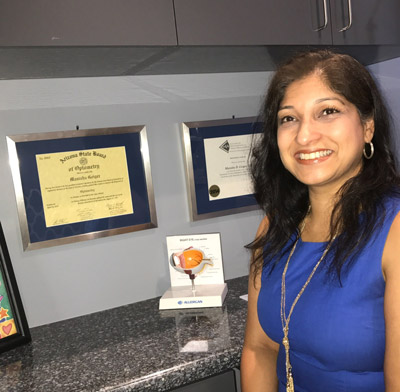

“One of my biggest challenges in the last 17 years was trying to incorporate what I enjoy in a primary care environment,” says Manisha Geiger, OD. Her specialty work in neuro-optometric rehabilitation, vision therapy and pediatrics often requires special tools and instrumentation, and it was difficult to fit into primary care office spaces and schedules. “It’s been a bit of a roller coaster,” Dr. Geiger says, describing her move to Arizona with her husband following her graduation from the State University of New York College of Optometry to working in a private office where she hoped to transition from an associate to an owner. However, the existing owner was not receptive to her desired changes, such as adding pediatric services. She parted ways and worked in a few corporate roles for several years where she was in charge of the office, but it wasn’t quite the right fit for what she wanted.
Over the course of losing both of her parents in the past few years, Dr. Geiger says she knew it was time for a change. “Life is too short,” she says. “I realized how important it is to follow one’s dreams.” Dr. Geiger established her corporation in September 2015. Throughout 2016, she built her patient base in a subleased space in another optometrist’s office. Her connections with local neurologists drew in so many patients with traumatic brain injuries, concussions and brain tumors that by August 2016, she was searching for her own place to fulfill the high demand for care.


Her original plan was to lease, but she ended up buying. “Many practices here were not making it because they were in a difficult
leasing situation with hidden fees and increases every month,” she explains. She and her husband decided it was the right financial commitment to purchase her space, located in a professional complex in Scottsdale, Arizona, just 10 minutes from her home. Many of the offices have a medical focus, and a corneal specialist surgeon there has quickly become a wonderful referral source. Her office opened in April and it’s warm and inviting, designed to be comforting to special needs patients who may be overwhelmed in the environment of a typical doctor’s office.
The benefits outweigh the challenging and scary moments, she says. Dr. Geiger can spend 45 minutes with patients without feeling rushed, and she’s no longer moving around equipment to accommodate each special case. “It’s one of the most rewarding decisions I’ve ever made,” she says. “Even when it’s overwhelming, you have that patient who comes in and says, ‘You’ve changed my life,’ and that always makes it worthwhile.”
She hopes to create greater awareness of this specialty and that her colleagues pursue it themselves or find a local specialist to refer to when needed. “There are people who are struggling in school, can’t achieve what they want to in sports or have had their lives changed after a traumatic event. We have the tools to help them. I don’t expect all providers to pursue this specialty, but all optometrists do have the basic knowledge to assess binocular health enough to refer to the proper specialist.”


patients on their path to success.



